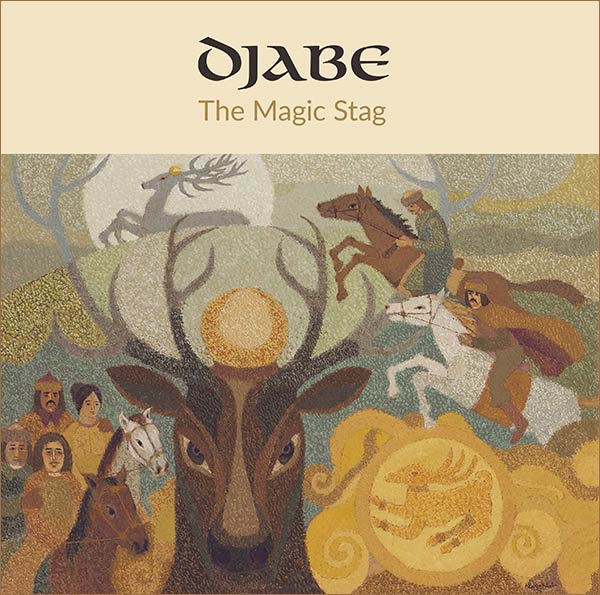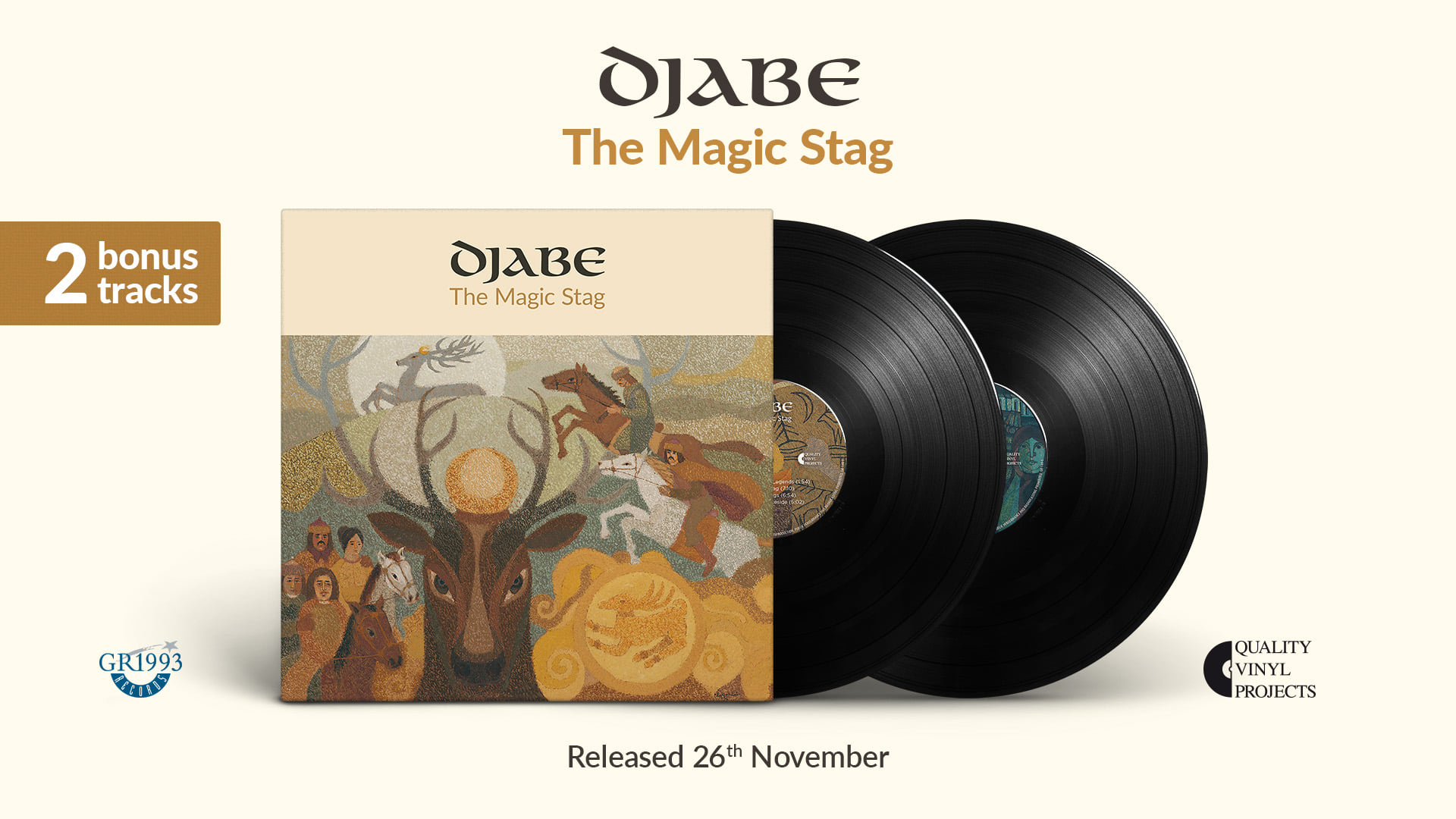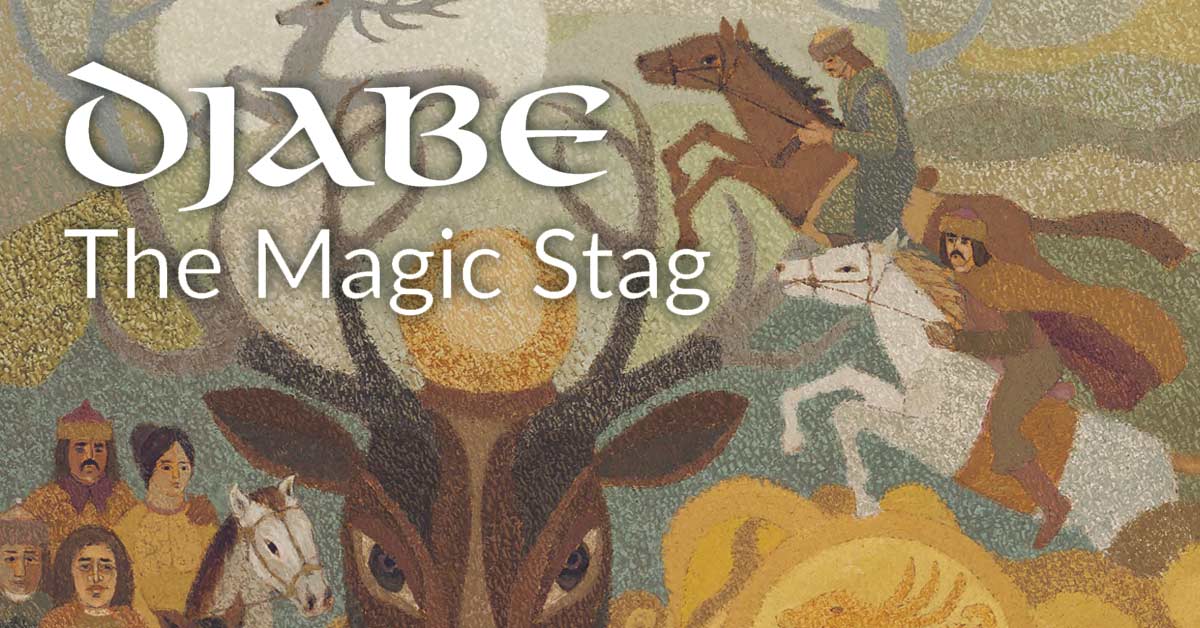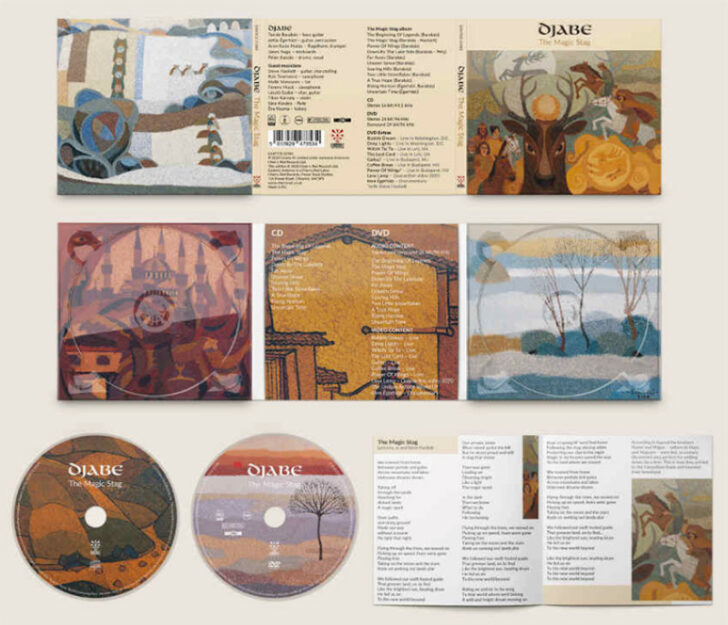- Article
- Read in 9 minutes
Djabe (feat. Steve Hackett) – The Magic Stag – Album review
The Magic Stag is the 2020 studio album by Hungarian jazz band Djabe. Steve Hackett (inlcuding his wife and Rob Townsend) is once more part of this project. Zoltan Kelemen has reviewed the album for you.
Steve Hackett’s “favourite band” is back with a new album, The Magic Stag. I probably do not need to explain anymore who Djabe are. In case you don’t know this brilliant band yet please check the info box (at the end of this review) to find out who Djabe are, when their cooperation with Steve began, and about their line-up in general. A number of guest musicians star on this album apart from the usual band members. Steve plays the guitar on seven of the eleven tracks. Another old acquaintance is the man who plays the tenor saxophone on the third track, one Rob Townsend.
The album was inspired by old Hungarian folk tale of the Magic Stag (see the other info box). Every Hungarian knows it, and it is held as dear in Hungary as the Nibelungenlied. The roots from which The Magic Stag (the album) would develop go back quite some time. When Djabe released Sheaves Are Dancing in 2003 one major source of inspiration were paintings by the Attila Égerházi’s father who is a Hungarian painter of renown. Their idea was to transfer the mood of the paintings into music and to paint, as it were, with music.
The tale of The Magic Stag
According to this old Hungarian tale the princes Hunor and Magor encounter a wonderful, royal stag. They embark on a wild hunt for the animal, but fail to kill it. Their quarry escapes them again and again. They follow the animal for many days into unknown territory and finally reach a glade with a lake in which two beautiful young damsels are taking a bath. Fate has it that the damsels are princesses. They take a liking to each other, and soon there is a double wedding. Both raise families and settle in the fertile area the stag has taken them to. The descendants of Hunor grew into the people of the Huns while Magor is the original ancestor of the Magyar, the Hungarian people.
They were prompted to do The Magic Stagby Jo and Steve Hackett, who felt inspired by the legendary animal and approached them with the lyrics for the first song. While they told him how the lyrics came about, Attila Égerházi suddenly envisioned a painting of his father’s about the myths and folklore of the Magyars. He took it as an intuition to approach the new Djabe album in a similar way to their 2003 record. Tamás and Attila agreed and began looking through Imre Égerházi’s oeuvre for paintings that could inspire them for the new album.
And that is how The Magic Stag happened, as a kind of concept album. Two worlds are entwined here and form the structure for the songs and the music: One is the world of old Hungarian myths and folk lore, the other is comprised of the paintings Attila’s famous father painted.

The recordings took place between January and June 2020, for the most part during the Covid-19 lockdown. Most of the musicians would record their part on their own, and Tamás Barabás mixed the tracks into the completed masterpiece.
As on many tracks of the two Sardinia Tapes albums, many of the songs are smooth and melodic jazz. Steve termed it a kind of ambient jazz in the liner notes of the second Sardinia album. Remarkable bass and the drums form the backbone of most pieces. Áron Koós-Hutás plays the trumpet throughout, sometimes just supporting the tracks, sometimes very prominently in the foreground. There are solos on guitar, keyboards and the instruments of various guest musicians.
There is, however, a new facet to Djabe’s music. In accordance with the album topic Hungarian melodies have been woven into most tracks. Some of them are played on original, local instruments – you get some world music thrown in for free.
What impressed me on the Sardinian albums impresses me here, too. Djabe play as a team. Each musician adds to the idea and the mood of the track. Steve also does what he does best (in my eyes): He complements the songs with his delicious feeling guitar play and his ideas, and he really makes them shine.
The brief world music intro is followed by four uptempo tracks in Djabe’s general vein. After that, the album grows quiet, more thoughtful, even dark and melancholy. There is nothing left of the sun-flooded high spirits on the beaches of wonderful Sardinia. Djabe’s familiar jazzy sound picks out a number of melancholy tunes from Hungarian history. The liner notes reveal that Attila in particular went through very difficult times in his private life at the time. The atmosphere of The Magic Stag may reflect that as well as the depressing situation at the time of recording, i.e. the Covid-19 lockdowns.
Let me tell you a few things about the individual tracks (an asterisk * marks those on which Steve plays):
Beginning of Legends
Drums, flutes and a peculiar string instrument (a necked bowl lute called a cobza) and a piano – oriental sounds start off the album. With the very beginning Djabe show this album is about Hungary’s past rising from the mists of oral tradition and folklore. This short track (less than two minutes) is barely more than an appetizer and moves on straight into the title song.
The Magic Stag *
This sounds like the Sardinia albums. This is the Djabe we know. A strong rhythm section, complex drumming, powerful bass, and the typical trumpet. And suddenly vocals – this is new. This is the first of two songs on which the drummer Péter Kaszás also sings. It is, of course, the story of the magic stag that is told here.
Steve and Jo wrote the lyrics together. Spot Steve’s dark voice in which he narrates part of the story.
Power Of Wings
Sitar sounds and Rob’s saxophone can be heard in the beginning of this tracks. The oriental basic melody is picked up and varied by various modern instruments in the course of the track only to return to the original version a bit later. Jazz music playing with an old tune.
Down By The Lakeside
The second song on which Péter Kaszás sings. The vocals give it a certain mainstream feeling; it reminds me of a certain West coast sound of the late 1970s.
Far Away
Full of rhythm and jazz, brilliant solos, varied drums, complex bass tunes – and that’s just the foundation of many time signatures for trumpet, keyboard and guitar to play above. This is Djabe at its best – it shows the musical strength of the band – the highlight of the album, for me.
Unseen Sense*
One of the quiet pieces, it is distinguished by the extremely soulful way Steve plays the acoustic guitar. It seems a bit out of place after the preceding rhythmic fireworks, but it is a fine track on its own, ideal to lean back and muse.
Soaring Hills*
A mid-tempo piece. Bass and drums keep to the background. Guitars, keyboards, trumpets and a saxophone calmly add melodies on top. It seems a bit slow in the beginning, but the song picks up momentum throughout the song; could have been a bit longer.
Two Little Snowflakes*
Inspiration for this song came from Tamás Barabás’s young daughter playing the piano. The piece is, in fact about his two little children. A quiet, simple song based on a core melody that keeps repeating.
A True Hope *
Tamás dedicates this piece to Attila and his family, who apparently went through a hard time while the album was written. Another thoughtful track with some fine playing by Steve.
Rising Horizon *
Quite a dark and oriental introduction, it begins with keyboard sounds and vocals Attila Égersági’s father recorded in the 1970s at a folklore festival in Erdély, Transsylvania. Other sounds come in that would not have sounded out of place on Peter Gabriel’s Passion. After three minutes, the song moves into the familiar Djabe sound – a strong piece – my second favourite on this album.
Uncertain Time*
Attila Égersági wrote this piece and dedicated it to his wife and daughter. A slow piece with a number of prog elements (to my ears, at least) and many interesting instruments. The track keeps evolving, and it grows on me every time I listen to it.
Saris Dream * (Extra Track on vinyl)
This twelfth track is a special extra that only appears on the LP version of the album.
Six years ago, Attila began to write a song with his daughter who was three years old at the time. This here is the finished version. She plays kalimba, djembe drums, guiro and alto flute. The track begins much like Two Little Snowflakes, i.e. simple, harmless, slightly boring. But the track picks up variety and speed after the slightly pedestrian introduction. The second half makes up for it and features an interesting solo by Steve.
The Magic Stag will come out in later September [2020] on a CD/DVD set. The CD contains all songs. The DVD has all songs in high definition stereo and surround sound, and it is rounded off with various videos from Djabe live shows as well as a ten-minute documentary about the art of Imre Égerházy.
The pleasant cover was created using paintings by Attila’s father. The booklet uses the same style and gives you an idea of the album and its background with many pictures. Attila and Tamás also describe with many details and emotions how the album as a whole and individual songs developed.
All in all
If you enjoyed Djabe’s Sardinia tapes you are going to enjoy much on this album. There is much more going on in the music now, though, it is not as homogenous and easy-listening anymore. The Magic Stag has many more facets, offers more variety. Some tracks and parts are “jazzier”, less smooth, less melodious, and have impressive performances by the musicians.
We frequently hear old Hungarian melodies and instruments that sound oriental, outlandish to the ears of people in Western Europe. The mood is darker, the speed slower, but you feel that Djabe have put their heart and soul into creating a very personal music that is very important to them. The way they talk about it in the booklet makes clear that Tamás and Attila are very happy with the result. Says Attila: “This album is very special for me as it is the second one where we paint soundscape visuals with our instruments to enhance the unique picturesque world of my father’s paintings”.)
I enjoyed the album very much, but I must admit I am slightly biased. The topic, the mood and the melodies touch certain strings in my Hungarian soul, and it is obvious that the album was created with very strong emotions. I would like to close with Attila Égerházy’s final words in his liner notes: “The Sheafs Are Dancing album was the very first cooperation with Steve and after 17 years he is still with us. Goosebumps my friends!”
By Zoltan Kelemen, English by Martin Klinkhardt
The Magic Stag can be preordered at CherryRed, amazon-uk and elsewhere.
There will be a vinyl version of the album, with two aditional bonus tracks (one of these tracks is Saris Dream, see above). The vinyl will be released in November and can be preordered at Steve Hackett’s webstore.

|
About Djabe Djabe is a Hungarian jazz/fusion/world music band who enjoy mixing up their jazz with a bit of Hungarian folklore. The band’s name was borrowed from the African language family Akan and means “freedom”. Djabe was founded by Attila Égerházi and others in 1995. It has undergone a number of personnel changes since then. Attila, who plays the guitar, and Tamá Barabás, the band’s bass player, are at the core of the band; they also write most of the songs. Áron Koós-Hutás has been with them for quite some time now; his trumpet-playing has become a characteristic of the Djabe sound. János Nagy plays the keyboards, while Péter Kaszás plays the drum and also sings on two tracks. The collaboration between Steve and Djabe began when Attila took over the distribution of Steve’s albums in Hungary. In 2002, he set up Steve’s first acoustic concert in Budapest and went on to produce the album Hungarian Horizons with him. The year after their first cooperation appeared on a Djabe album. Since then they have played many shows together and produced a number of albums. Steve calls them “the best band I have ever played with.” |


